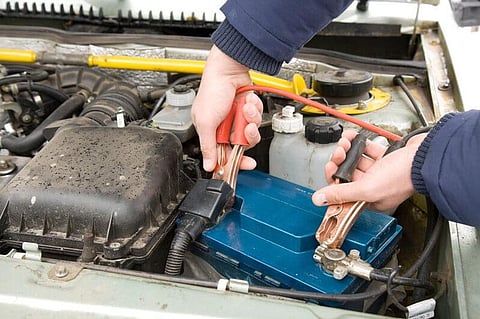
- Home
- न्यूजग्राम
- NewsGram USA
- India
- World
- Politics
- Entertainment
- Culture
- Lifestyle
- Economy
- Sports
- Sp. Coverage
- Misc.
- NewsGram Exclusive
- Jobs / Internships

By Linda Carter
Jumper cables can be a saving grace when you accidentally let your battery run flat. They have saved many drivers who found themselves stranded by a car that won't start. However, if you are shopping for jumper cables, you will likely notice that there are a lot of options. In particular, jumper cables have different gauges, which can significantly affect the price. Which should you buy?
First, it is important to understand what gauge is measuring. As with all wires, a gauge is a measurement of the thickness of the wires in the cables. Lower numbered gauges mean thicker wires. So, a six-gauge set of jumper cables is thicker than an eight-gauge set.
Follow NewsGram on Instagram to keep yourself updated.
With that in mind, you should check your vehicle's owner's manual before you shop. This will likely have information about which are the best jumper cables for your vehicle. Alternatively, your battery may have some information if you still have the documentation.
As a rule of thumb, the more power necessary to get a vehicle started, the thicker the cables you need. So, these are some rough estimates of the type of vehicle different gauges can handle:
2 Gauge: Almost any vehicle included trucks and diesel engines.
4 Gauge: Most passenger vehicles including pickup trucks, SUVs, and smaller vehicles.
You should check your vehicle's owner's manual before you shop. Flickr
6 Gauge: Full-size cars and compact SUVs/smaller crossovers.
8 Gauge: Most sedans and some subcompact SUVs.
10 Gauge: Only very small, economy cars.
If you get incorrect jumper cables, you will likely fry them when you try to jump the vehicle. So, it is often a good idea to get something a little more substantial than the bare minimum. Your Duralast battery warranty may not cover damage from bad jump-start practices. Nonetheless, you don't want to waste money on 2-gauge cables for your subcompact sedan.
You should also look at the insulation and clamps on the jumper cables. More substantial insulation will help with higher-power jumps. Additionally, strong clamps tend to conduct electricity much more efficiently.
Ideally, you should get copper jumper cables. However, you can get away with aluminum if you have a smaller vehicle.
As described above, the difference between jumper cable gauges is the thickness of the wire. So, if you are looking for cables that can handle a stronger current, then 4 gauge is better than 6 gauge. However, the cost is another key consideration. The higher gauge cables will almost always be less expensive. Plus, 6 gauge is good enough for a lot of vehicles, especially if they are copper. Therefore, picking your jumper cables is a balancing act between cost and capacity.
The above information should help you to find the right Jumper cables to buy for your vehicle. Keep in mind that you shouldn't need to jump your battery often. If you find yourself breaking out the cables often, consider doing some battery testing; you may need a replacement. Fortunately, you can do this for free at many places including AutoZone. Place your order for new jumper cables today.
(Disclaimer: The article is sponsored, and hence promotes some commercial links.)
